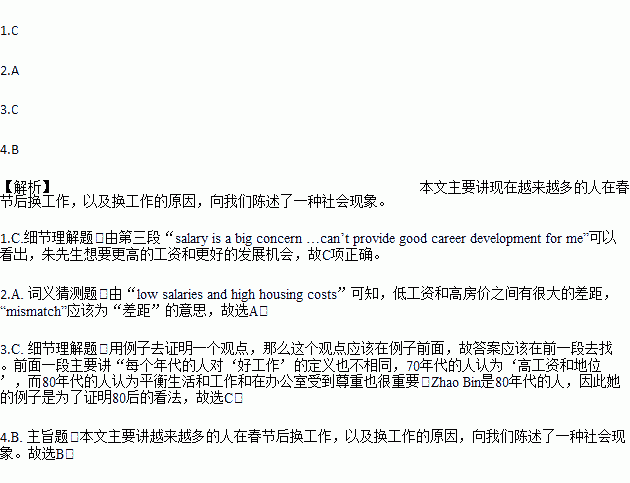题目内容
For more and more young Chinese professionals, the first day back at work after the Lunar New Year holiday is the day they quit.
The period after the Lunar New Year holiday, also known as Spring Festival, often sees Chinese workers on the move. This year, the number looking for new opportunities is supposed to be especially high.
Mr. Zhu, a 27-year-old Beijing native, is one of the young workers looking for a better deal. “Salary is a big concern for me and I need a job that pays more, and my department can’t provide good career development for me,” he said.
An online survey by Zhaopin.com, a leading job-hunting website, provides further details on why China’s young white-collar workers are so keen to move on.
Low salaries are the biggest concern for 62% of the job-hunters, and overtime and a wide mismatch between low salaries and high housing costs are also the complaints. Two-thirds of them said they had to work at home after office hours, and a full 95% said they felt they were under heavy pressure because of the housing payment or rent.
The survey also found that what was seen as a “good job” has changed. For the generation born in the 1970s, high salary and status is the key. For the generation born after 1980, work-life balance and respect in the office are also important.
Zhao Bin, a 28-year-old woman who earns over 7,000 yuan a month working at a public relations company in Shanghai, said she would wait until the Lunar New Year to change her job. “My salary is OK for me, but I am working like crazy. So I want to find something comfortable, like being an English teacher in training schools.”
1.Mr. Zhu is looking for a new job because ________.
A. he was fired before the Lunar New Year holiday
B. he was promised a better job
C. he wants a job better in salary and in development
D. he was advised to do so
2.Which of the following can best take the place of the underlined words “a wide mismatch”?
A. a big gap B. a lost game
C. a hot debate D. a failed marriage
3.The writer uses the example of Zhao Bin to prove that ________.
A. salary is the first concern for people who change jobs
B. young people are under pressure of high housing prices
C. young people tend to value work-life balance
D. teacher has become a good job for Chinese youth
4.The article is intended to ________.
A. encourage Chinese white-collar workers to change jobs
B. present a social phenomenon and explain its causes
C. carry out an online survey to readers
D. compare different reasons why people quit jobs

